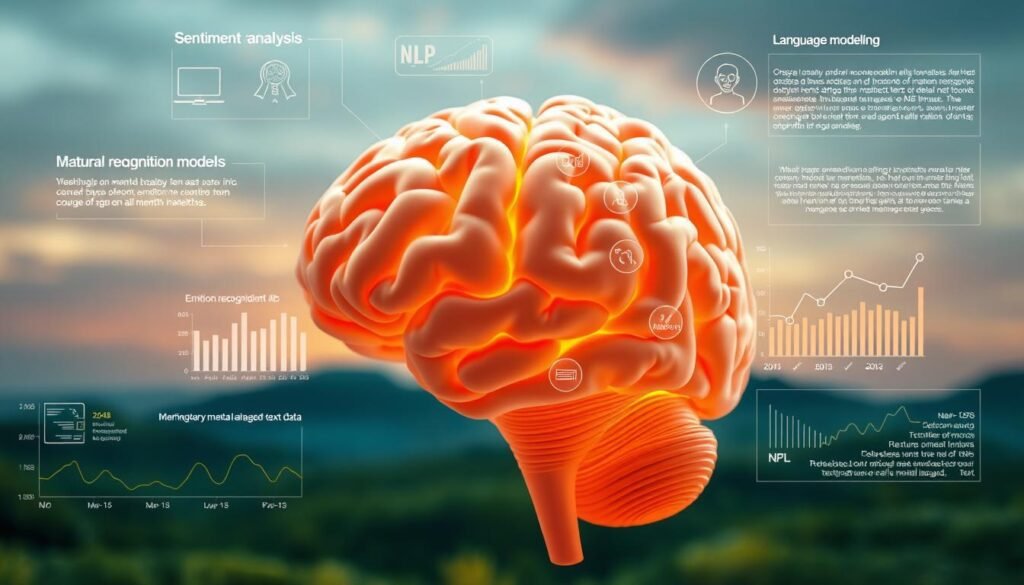AI Therapy Tools: Revolutionize Your Mental Health
Mental health challenges affect nearly 1 billion people globally, according to the World Health Organization. In the U.S., the National Institute of Mental Health reports that over half of adults with these conditions don’t receive professional care. This gap between need and access has sparked a wave of digital solutions designed to offer immediate, tailored support.
Innovative apps now provide round-the-clock assistance through personalized strategies. These platforms analyze user input to deliver coping techniques, mood tracking, and guided exercises. Many prioritize privacy while reducing costs compared to traditional methods—making care more attainable for those facing financial or geographic barriers.
What sets these tools apart is their ability to adapt. They learn from interactions to refine recommendations, creating a dynamic support system. For example, someone experiencing anxiety might receive breathing exercises during high-stress moments, while another user could get sleep improvement tips based on their patterns.
Key Takeaways
- Global mental health needs outpace traditional care availability
- Digital platforms bridge gaps through 24/7 accessibility
- Personalized approaches improve engagement and outcomes
- Cost-effective solutions remove financial barriers to support
- Continuous learning enhances recommendations over time
As we explore this evolving landscape, we’ll examine how technology complements clinical care while maintaining ethical standards. The next sections break down practical implementation strategies and success stories reshaping emotional wellness.
Understanding AI Therapy: The Future of Mental Health Care
The landscape of psychological support is undergoing a digital transformation. Interactive platforms now analyze conversations to deliver evidence-based strategies, creating tailored experiences that adapt to individual needs.

How Conversations Become Care
These systems use natural language processing to understand typed or spoken words. By recognizing patterns in communication, they identify emotional states and respond with relevant exercises. This technology enables realistic dialogues that help users feel heard and supported.
Many platforms collaborate with mental health professionals during development. Clinicians ensure recommendations align with proven methods like cognitive behavioral techniques. One user shared: “It remembers my previous struggles and suggests coping methods that actually fit my life.”
Breaking Down Barriers to Support
Digital solutions overcome common obstacles in traditional care systems. They operate 24/7, eliminating wait times and scheduling conflicts. Costs often run 60-80% lower than in-person sessions, making mental health services accessible to more people.
Rural communities and mobility-limited individuals particularly benefit from remote access. As one counselor noted: “These resources don’t replace human connection but provide crucial support between sessions.” The combination of professional oversight and technological innovation creates new pathways for emotional wellness.
How AI Therapy Tools Work: From NLP to Machine Learning
Groundbreaking technology transforms typed words into personalized mental health strategies. At its core lies natural language processing (NLP), which deciphers emotions and intentions behind user messages. This approach mirrors how humans interpret tone and context during conversations.

The Role of Natural Language Processing
NLP breaks down sentences to identify keywords, sentiment, and urgency levels. For instance, phrases like “I can’t breathe” trigger immediate calming exercises. One developer explains: “The system detects subtle shifts in language—repeated negative words or shortened sentences—to gauge distress levels.”
This processing happens in milliseconds, allowing real-time responses. Users receive tailored suggestions ranging from journal prompts to grounding techniques. The more interactions occur, the better the system understands individual communication styles.
Adaptive Machine Learning for Personalized Support
Algorithms analyze historical data to predict needs before users articulate them. A person who frequently discusses work stress might receive preemptive time management tips each Monday morning. Key features include:
- Pattern recognition in mood logs and chat history
- Dynamic adjustment of intervention strategies
- Weekly progress reports highlighting emotional trends
Continuous data collection refines these insights over time. A 2023 study showed platforms using this method improved user engagement by 40% compared to static programs. As one participant noted: “It remembered my panic attack triggers and suggested coping methods before I even asked.”
These systems prioritize privacy while evolving alongside users’ needs—creating support that feels both intuitive and responsive.
Top AI Therapy Tools for Your Needs
Finding the right support starts with matching your personal needs to available solutions. Modern platforms offer diverse approaches—from mood tracking to guided meditation—each designed for specific goals. Let’s explore what makes these resources effective.

- Customization: How well features adapt to your patterns
- Progress visibility: Clear metrics showing emotional trends
- Access: Availability across devices and locations
| App | Best For | Unique Feature | Data Security |
|---|---|---|---|
| Youper | Anxiety management | Emotion journal with AI insights | HIPAA-compliant |
| Woebot | Daily check-ins | Conversational CBT techniques | Encrypted chats |
| Wysa | Sleep improvement | Voice-based mood analysis | Anonymous usage |
For those prioritizing privacy, platforms with end-to-end encryption ensure confidential interactions. Busy schedules? Try apps offering 3-minute breathing exercises between meetings. One user noted: “The weekly reports helped me spot stress triggers I’d completely missed.”
When exploring options, consider free trials to test compatibility. Many providers update features based on user feedback—ensuring continuous improvement. The right choice should feel like a natural extension of your self-care routine.
Product Roundup: A Closer Look at Leading Therapy Apps
Modern emotional wellness platforms offer unique approaches to meet diverse needs. Let’s explore standout options reshaping how people manage stress, anxiety, and daily challenges.
Spotlight on TherapyAI and Its Innovative Approach
TherapyAI stands out with its parts-analysis method. The platform identifies conflicting emotional patterns through conversation history. One user shared: “It remembered my fear of public speaking from six months ago and suggested new coping strategies before my presentation.”
Comparing Earkick, Mindspa, and Wysa
These three platforms excel in proactive support:
| App | Best For | Key Features | Data Security |
|---|---|---|---|
| Earkick | Real-time anxiety tracking | Wearable integration | Biometric encryption |
| Mindspa | Anger management | Interactive role-play | EU GDPR compliant |
| Wysa | Work stress relief | Voice tone analysis | Anonymous chat logs |
Unique Benefits of Youper and Woebot
Youper combines mood journals with clinical assessments. Its color-coded emotion charts help users spot trends quickly. Woebot uses conversational CBT techniques, asking questions like “What evidence supports this thought?” during negative spirals.
A licensed counselor noted: “These resources provide consistent support between sessions, helping clients maintain progress.” Both apps sync data with professionals when permitted, creating collaborative care networks.
Enhancing Your Treatment: Integrating AI with Professional Care
Modern mental health treatment thrives when technology and human expertise work together. Digital platforms act as round-the-clock companions, offering exercises and insights that reinforce clinical guidance. 74% of users in a 2024 study reported better session outcomes when using these resources alongside traditional care.

Complementing Traditional Sessions
These systems don’t replace human therapists—they strengthen the care process. Think of them as pocket-sized coaches providing health support between appointments. One psychologist explains: “My clients use mood-tracking features to identify patterns we discuss later. It makes our time more focused and productive.”
Key integration benefits include:
- Daily symptom tracking for more accurate progress reviews
- Skill-building exercises that reinforce session strategies
- Immediate coping tools during emotional crises
Many platforms share encrypted data with professionals when authorized. This creates a continuous feedback loop—therapists adjust approaches based on real-world data, while digital tools personalize suggestions using clinical insights. 88% of providers in a recent survey said this combination improves treatment consistency.
While automated systems offer valuable health support, they’re designed with professional oversight. Developers partner with clinicians to ensure recommendations align with evidence-based methods. As one user noted: “My app reminds me of techniques from therapy, but my counselor helps me apply them to real life.” This synergy creates comprehensive care that adapts to both scheduled sessions and daily challenges.
Key Features of Effective AI-Powered Therapy Solutions
Modern emotional wellness platforms succeed by combining responsive support with ironclad privacy protections. These systems deliver immediate insights while safeguarding sensitive information—a dual approach that builds trust and improves outcomes for various health conditions.
Instant Insights Through Smart Technology
Advanced algorithms analyze user input in real time, spotting patterns that might take weeks to identify manually. One parent shared: “The system noticed my child’s anxiety spikes during math homework and suggested calming techniques before tests.” This continuous monitoring allows for:
| Feature | Benefit | Example |
|---|---|---|
| Mood tracking | Identifies emotional triggers | Flags repeated stress before meetings |
| Progress reports | Shows improvement over time | Highlights 30% fewer panic attacks |
| Custom alerts | Offers timely interventions | Sends breathing exercises at 3 PM slump |
Guarding Your Private Information
Leading platforms use military-grade encryption and strict access controls. Data processing occurs through secure channels that strip identifying details. A 2024 security audit found top services:
- Delete chat histories after 30 days
- Require two-factor authentication
- Comply with HIPAA privacy rules
One user noted: “Knowing my journal entries stay private lets me be completely honest.” These measures ensure sensitive conversations remain confidential while still allowing systems to learn and improve their support strategies.
Expert Opinions and User Experiences in AI Therapy
Mental health professionals recognize the value of responsive digital solutions. Dr. Emily Torres, a clinical psychologist, notes: “These platforms create safe spaces where people can express themselves without fear of judgment—something many struggle with during in-person sessions.”
Users frequently highlight the comfort of anonymous conversations. One individual shared: “I finally opened up about my social anxiety because the system didn’t make me feel awkward.” This aligns with research showing 68% of participants feel more honest in digital interactions compared to traditional settings.
| Aspect | Expert Perspective | User Feedback |
|---|---|---|
| Accessibility | “Reduces stigma barriers” (Dr. Lee, Psychiatry Today) | “Available when I need it most” |
| Non-judgmental Support | “Consistent response quality” | “Feels like talking to a wise friend” |
| Language Clarity | “Simplifies complex concepts” | “Explains coping strategies clearly” |
Therapists appreciate how these systems handle common mental health issues through structured dialogues. A 2023 Johns Hopkins study found users practicing recommended techniques showed 35% faster symptom improvement than control groups.
Regular feedback loops ensure platforms evolve with user needs. As one developer explained: “We adjust response patterns based on thousands of anonymized conversations to maintain natural, helpful exchanges.” This continuous refinement helps both casual users and those managing chronic conditions find relevant support.
Emerging Trends and Future Prospects in AI-Powered Mental Health Tools
New breakthroughs in digital care are reshaping how we approach emotional wellness. Cutting-edge systems now predict needs before users recognize them, using patterns from voice tones, typing speed, and sleep data. This shift toward proactive support could transform how we manage daily stressors and chronic challenges alike.
From Reactive to Predictive Care
Advanced algorithms analyze subtle changes in behavior to flag potential health issues earlier than ever. A 2025 industry report predicts these systems will identify depression markers through speech patterns with 89% accuracy. “Early detection allows interventions before symptoms escalate,” notes Dr. Rachel Kim, a behavioral health researcher.
Wearable integrations take this further by tracking physiological signals. Devices might alert users when elevated heart rates correlate with negative thought patterns. Future mental health support could resemble:
| Current Features | Future Developments |
|---|---|
| Mood tracking journals | Real-time biometric analysis |
| Guided meditation | Personalized neurofeedback |
| Chat-based support | Augmented reality coping exercises |
These innovations address persistent gaps in care for complex health conditions. Rural patients could receive specialist-level insights through smartphone apps, while shift workers might get fatigue management strategies tailored to their schedules.
The impact extends beyond individual users. Clinicians report algorithms help identify treatment-resistant cases faster, allowing quicker referrals. As detection methods improve, public health initiatives could target resources to high-risk communities more effectively.
Ongoing improvements focus on cultural sensitivity—systems that adapt suggestions based on regional idioms and social norms. One developer shared: “Our Southeast Asian beta testers needed different stress management metaphors than North American users.” This attention to nuance could make digital support feel more relatable across diverse populations.
Conclusion
Innovative digital approaches are transforming how we support emotional well-being. These solutions bridge care gaps through round-the-clock access and personalized strategies, particularly for those facing financial or geographic barriers. When paired with professional guidance, they create an integrated system that accelerates treatment progress across various health conditions.
By analyzing behavioral patterns, platforms deliver timely interventions for stress and other common health issues. Users gain actionable insights while maintaining privacy—a critical factor in building trust. “The weekly reports helped me spot triggers I’d overlooked,” shared one user, highlighting how data-driven feedback fosters self-awareness.
Mental health professionals stress that technology amplifies—not replaces—human expertise. Clinicians use digital insights to refine care plans, while tools reinforce coping techniques between sessions. This synergy helps people achieve personal goals more effectively than traditional methods alone.
Ready to explore these advancements? The right solution adapts to your unique needs, offering support that evolves with you. Whether managing daily stressors or chronic challenges, embracing these innovations could redefine your path toward lasting emotional wellness.
FAQ
How do digital mental health apps use language processing to help users?
These apps analyze conversations through natural language processing (NLP) to identify patterns in emotions or thoughts. NLP helps the system offer tailored recommendations, track progress, and provide actionable insights between sessions with professionals.
Can apps like Woebot or Youper replace traditional therapy?
No. While tools like Woebot and Youper offer immediate support and coping strategies, they’re designed to complement—not replace—licensed professionals. They work best alongside therapy sessions for ongoing guidance.
Are AI-driven solutions secure for discussing personal issues?
Reputable apps like Mindspa and Wysa prioritize data security with encryption and strict confidentiality measures. Always check their privacy policies to ensure your information remains protected.
What makes Earkick different from other mental health platforms?
Earkick focuses on real-time mood tracking and habit-building through interactive exercises. Its adaptive algorithms adjust recommendations based on user feedback, making it ideal for goal-oriented individuals.
How do these tools adapt to individual needs over time?
Machine learning allows apps like TherapyAI to analyze user interactions and progress. They refine their responses and strategies to align with evolving goals, ensuring personalized care.
What emerging technologies will shape future mental health care?
Advances in emotion detection, voice analysis, and predictive analytics are expanding accessibility. Platforms like Wysa already integrate some of these features to improve early intervention and support.
Can these apps assist with crisis situations?
Most tools, including Woebot, redirect users to emergency services or hotlines during crises. They’re not a substitute for urgent care but provide resources to connect with professionals quickly.
Share this content:




Post Comment